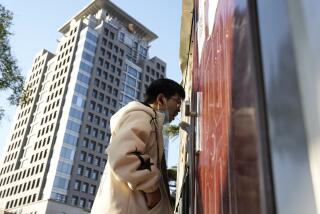Peking Denies Racism Caused Clashes Between Chinese and African Students
- Share via
PEKING — The Chinese government on Saturday issued an extraordinary public defense of its treatment of African students in this country and denied that conflicts between African and Chinese students are the result of racism.
“It has been the consistent, long-term policy of the Chinese government to oppose racism,” a spokesman for the State Education Commission told a press conference. He said that any racial discrimination on Chinese university campuses “will be punished by law.”
Education officials called the press conference to try to dampen a controversy over a riot at Tianjin University two weeks ago.
On May 24, a crowd of about 300 Chinese students, complaining of noise, surrounded a dining hall where African students were holding a dance and began throwing stones inside. Officials said that the Africans threw bottles from the dining hall at the Chinese students.
In the wake of that incident, African students have been raising broader complaints about the way they are treated in China. On Friday, about 200 African students marched through Peking to protest what they called continuing racial discrimination.
The protests put the government in an extremely awkward position because China seeks to identify itself as a Third World nation and to express support for the nations of black Africa.
China began admitting African students to its universities in 1959. Of the 3,500 foreign students attending Chinese universities for more than a year, about 1,600 are African, including Arabs from North Africa.
African students generally come to China for as long as five or six years, first spending a year studying Chinese at Peking’s Foreign Languages Institute. Most of the students receive free tuition and housing under scholarship programs arranged between their governments and China.
In general, foreign students at Chinese universities are required to live in domitories separate from those of Chinese students. Permission is sometimes granted for a Chinese student to live in a foreigners’ dorm, but the reverse is rarely, if ever, allowed.
Asked Saturday about this policy of enforced separation, Yu Fuzeng, the Education Commission’s spokesman, said it is necessary because foreign students generally live two to a room, while Chinese students live five or six to a room. “We need to provide them (foreign students) dormitories with separate living conditions,” he said.
Over the past decade, there have been several other incidents between Chinese and African students. Apparently the most serious occurred in 1979, when 19 foreign and 23 Chinese students were injured during a melee at Shanghai’s Textile Engineering Institute. That incident, too, broke out after Chinese students objected to noise of music played by African students.
Several Were Hurt
Chinese officials said that in the May 24 disturbance at Tianjin University, two Chinese students were seriously injured and three Africans and several other Chinese were slightly hurt.
Six days later, an estimated 500 to 600 Chinese students marched to the Tianjin municipal building, apparently to demand that the African students be punished.
Authorities tried to move the foreign students to another location in Tianjin, but the foreign students, who included a handful of Asians, insisted on being taken to Peking. Some have refused to return to Tianjin without official guarantees of their safety.
“On the whole, the Chinese students enjoy good and friendly relations with foreign students,” the Education Commission’s Yu said at Saturday’s press conference. “Because they are foreign students, they bring with them different customs, cultures and backgrounds. And particularly, they are young and excitable, so over the years, there have been some isolated incidents.”
More to Read
Sign up for Essential California
The most important California stories and recommendations in your inbox every morning.
You may occasionally receive promotional content from the Los Angeles Times.













